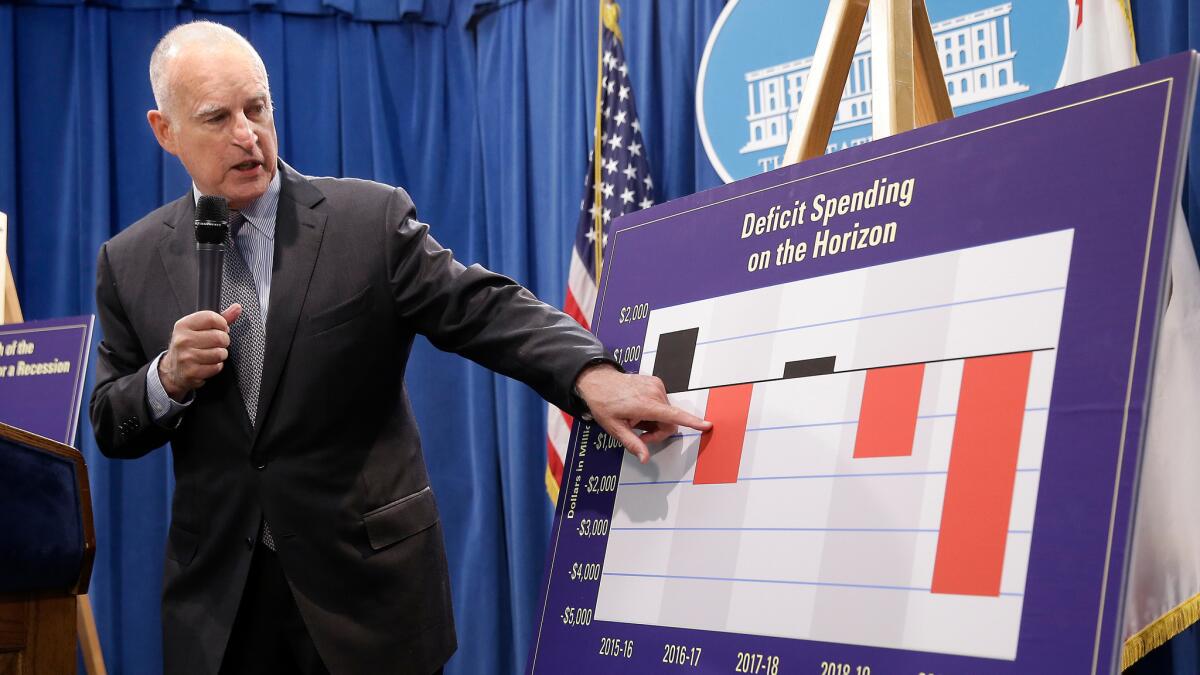Editorial: California’s sales tax rules need a complete overhaul, not incremental fiddling

Don’t tinker with the tax code. That admonition wasn’t in Gov. Jerry Brown’s message when he vetoed a series of bills this week that would have created several new tax breaks, including sales tax exemptions for diapers and feminine hygiene products. But it could have been. In fact, it should have been.
Piecemeal adjustments that give special treatment to particular products and people, deserving or not, make for bad tax policy. It’s regrettable that Brown didn’t say so explicitly in his veto message. Instead, he focused on the financial implications of the seven bills: “Tax breaks are the same as new spending — they both cost the General Fund money,” Brown wrote, noting that these particular proposals would have collectively cut state revenue by $300 million.
But you can read Brown’s warning between the lines because he has said consistently that changes to tax policy ought to be approached comprehensively, not undertaken willy-nilly. Last month Brown vetoed another proposed sales tax exemption, in that case for the sad souls who buy back their own possessions from pawnbrokers. Last year, the governor said virtually the same thing about taxes when he vetoed a whole bunch of bills proposing narrowly drawn tax breaks and credits.
Piecemeal adjustments that give special treatment to particular products and people, deserving or not, make for bad tax policy.
Brown must be tired of repeating himself. Legislators might want to take the hint and quit their incremental fiddling with tax policy.
There’s a real opportunity here for some forward-thinking legislators — perhaps Assemblywomen Lorena Gonzalez (D-San Diego) and Cristina Garcia (D-Bell Gardens), who authored the diaper and tampon tax waivers, respectively. Gonzalez and Garcia say they may propose the diaper and tampon carve-outs again next year, but as part of a package that would also remove the tax-free status from candy and snacks. If they extended the sales tax to all confections and bottled water, they could raise more than $1 billion a year.
Good for them for thinking bigger than one item. But they’re not thinking big enough. Why the heck is a Snickers bar tax-free and diapers are not? Why should Viagra get a free tax pass and not menstrual pads? The answers ought to be part of a comprehensive examination of whether the current sales tax fits our modern lifestyles, and of the principles on which our tax system is based.
It may not seem like it, but there is an underlying rationale to the state’s application of sales tax. “Necessities for life,” such as food, prescription drugs, housing and electricity, are exempt. So are things that have a general public benefit, such as art work purchased by a museum.
But there are also a number of contrary exemptions. For example, car buyers must pay sales tax on their new vehicles, unless they buy them from a family member. Soda is taxable, unless it is purchased with food-stamp benefits. Also, if you can figure out where to buy them, commemorative “California Gold” medallions are tax-free.
Perhaps it is time, as Gonzalez’s and Garcia’s proposals suggest, to add a new category to the sales tax rules, something like “Essentials for modern life.” Diapers and tampons would fit naturally into that description, as would other goods that fall somewhere between sustaining life and making it livable, such as toilet paper, toothpaste and soap.
But why stop there? As long as they are at it, the state’s tax code is overdue for an overhaul to make it less volatile and vulnerable to recession. This would also be an appropriate forum to explore Sen. Bob Hertzberg’s (D-Van Nuys) controversial idea to apply sales tax to services.
Comprehensive tax reform is a tall order, but if legislators don’t take a whack at it, this governor may never sign their individual tax-break proposals. Brown may even step into the breach and try to reform the tax code himself.
He certainly seemed to be inviting lawmakers this week to give it a try. His veto message recalled one from last year, when he nixed nine crime and sentencing bills and called on legislators to consider “how our system of criminal justice could be made more human, more just and more cost-effective.” Brown didn’t just raise this question; he acted. The result is Proposition 57, a criminal-justice reform measure on the November ballot. The governor has now opened the door in Sacramento for tax reform, and lawmakers should walk through it before he does.
Follow the Opinion section on Twitter @latimesopinion and Facebook
More to Read
A cure for the common opinion
Get thought-provoking perspectives with our weekly newsletter.
You may occasionally receive promotional content from the Los Angeles Times.






